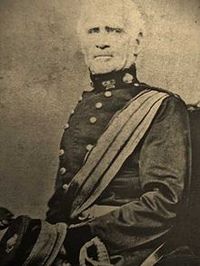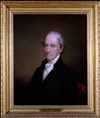
Source: Courtesy of Wikimedia Commons
ROWAN, Sir WILLIAM, field marshal and administrator of the Province of Canada; b. Isle of Man, 18 June 1789, eighth son of Robert Rowan of County Antrim, Ireland, and of Mary Wilson of County Down; m. Martha Sprong in 1811 (d. 1874), they had no children; d. at Bath, Eng., 26 Sept. 1879.
At the age of 14, William Rowan became an ensign in the 52nd Light Infantry, a regiment in which his uncle Charles Rowan and two older brothers, Charles (later Sir Charles, the first commissioner of the London Metropolitan Police) and Robert, also served. The renewal of the war with Napoleon brought the boy opportunities for active service and quick promotion. He became a lieutenant within a year and served in Sicily, 1806–7, and Sweden, 1808. Before he was 20 he commanded a company in the 2nd Battalion of the regiment and went with Robert Craufurd to Vigo (1808). He was also present at the capture of Flushing (1809). From 1811 to the end of the war Rowan took part in a number of engagements in the Peninsula and France; his conduct on the field at Orthez won him his brevet-majority. Rowan fought for the third time on a birthday (his 26th) at Waterloo, taking part in the 52nd’s famous charge under Sir John Colborne* against the Imperial Guard, an attack which some have said brought Wellington the victory. Rowan then went with the occupying force to Paris and was put in charge of the 1st arrondissement. On 21 Jan. 1819 he became a lieutenant-colonel in the army (he was a captain in his regiment).
In 1823 Rowan was posted with his regiment to New Brunswick, and in 1826 he transferred to the 58th (which was not stationed in Canada) with the rank of major in the regiment. Leaving Canada in 1829, he went on half-pay on 22 July 1830.
Sir John Colborne, Rowan’s war-time chief and life-long friend and patron, had come to Upper Canada in 1828 as lieutenant governor. Four years later Rowan joined him there as his military secretary (1832–39) to handle his correspondence on military matters. He also served him as civil secretary for Upper Canada from 1832 to 1836. The civil secretary, a personal appointee, conducted the whole internal management of the province, initiating or handling all public business and dealing with petitions for favours and appeals from decisions made by subordinate authorities. Colborne retired as lieutenant governor in 1836, but a year earlier he had been appointed commander-in-chief of the forces in Canada. Rowan thus served as Colborne’s military secretary when he dealt with the uprisings of 1837 and 1838. Rowan was made a colonel in 1837, and the next year was awarded the cb for his services during the rebellions. He served as civil secretary in Lower Canada in 1838, and returned to England in 1839.
Promoted major-general on 9 Nov. 1846, Rowan was granted the Distinguished Service Award on 1 April 1848 and returned to Canada a year later as commander of the British forces there. On 30 May 1849, when there was a possibility that the governor general, Lord Elgin [Bruce*] ight be insulted if he appeared in public since the violent disturbances in Montreal provoked by the rebellion losses bill had only recently abated, Rowan was sent to prorogue parliament, which he did with a conciliatory speech. Lord Elgin was on leave from 23 Aug. 1853 to 10 June 1854, and Rowan became administrator of the province. Ten days after Elgin returned, Rowan was promoted lieutenant-general and in that same year was appointed colonel of the 19th Regiment.
Rowan left Canada in 1855 and took up residence at Bath. He was knighted a year later (Military Knight Grand Cross of the Bath), and in 1861 became a colonel of his old regiment, the 52nd. On 13 Aug. 1862 he was promoted general and on 2 June 1877 field marshal. His death was occasioned simply by “a decay of nature.”
It was Rowan’s delight in his old age to claim that he had never purchased a commission or a promotion, a rare boast for that era and one which testified not only to his courage in the field but also to his abilities. He was entitled to wear a war medal with six clasps, but he marked a memorandum recounting his war services “strictly private” and during his long retirement at Bath was loath to talk about them. By contrast with his war record, Rowan’s years in Canada appear unexciting, but he brought with him the prestige of a distinguished military career and rendered good service in three different roles.
Illustrated London News, LXXV (1879), 322, 335, 337. The annual register: a review of public events at home and abroad for the year 1879 (London, 1880), 221. Boase, Modern English biography, III, 322. DNB. J. T. Haydn, The book of dignities, containing lists of official personages of the British empire . . . (3rd ed., London, 1894), 770, 778, 856, 882. Morgan, Sketches of celebrated Canadians, 549–50. Edward Walford, The county families of the United Kingdom or royal manual of the titled and untitled aristocracy of England, Wales, Scotland and Ireland (London, 1875), 843. Dent, Last forty years, II, 171, 280; Upper Canadian rebellion, I, 152.
© 1972–2024 University of Toronto/Université Laval
Image Gallery

Cite This Article
Richard A. Preston, “ROWAN, Sir WILLIAM,” in Dictionary of Canadian Biography, vol. 10, University of Toronto/Université Laval, 2003–, accessed April 19, 2024, http://www.biographi.ca/en/bio/rowan_william_10E.html.
The citation above shows the format for footnotes and endnotes according to the Chicago manual of style (16th edition). Information to be used in other citation formats:
| Permalink: | http://www.biographi.ca/en/bio/rowan_william_10E.html |
| Author of Article: | Richard A. Preston |
| Title of Article: | ROWAN, Sir WILLIAM |
| Publication Name: | Dictionary of Canadian Biography, vol. 10 |
| Publisher: | University of Toronto/Université Laval |
| Year of publication: | 1972 |
| Year of revision: | 1972 |
| Access Date: | April 19, 2024 |







